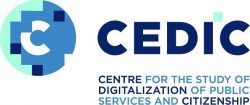Organization & Structure
CEDIC is organized in six research groups
I. The Platform Economy and Sustainable Welfare
Focuses on social innovation for sustainable welfare models in the context of the twin green and digital transitions and resistance to digitalization and digital surveillance.
IV. Digitalization and Everyday Life
Explores how digitalization affects the everyday life of families and domestic life, and their interaction with school, health, and welfare services.
II. Digitalization, Law, and Governance
Examines regulatory policies, legislation, and ethical issues to ensure good governance of digitalized public welfare services and produce new knowledge on how legislation and policies in this policy domain are shaped, transformed and implemented.
V. Data Science Methods in Social Research
Applies, adopts and develops data science methods for use in digital social research.
III. Digitalization, Innovation, and Implementation
Explores innovation processes within welfare services, from initial idea conception and development through to practical implementation of new solutions across various welfare institutions.
VI. The Digitalization Process and AI Adoption in the Public Sector
Examines the management and benefit/cost-effects of digitalization and artificial technologies within public services and society. The research group also contributes to technology development and innovations in the field.
I. The Platform Economy and Sustainable Welfare
Examines and cross-nationally compares law and policy measures aimed to ensure that digitalization of public welfare services foster the exercise of full and effective citizenship for vulnerable persons. This research group is directed by researchers Arne Dulsrud and Dag Slettemeås from Consumption Research Norway (SIFO) at Oslo Metropolitan University (OsloMet).




Egeland from the Centre for
Welfare and Labour Research at OsloMet.
II. Digitalization, Law, and Governance
Conducts cross-national comparisons of regulatory policies, legislation and human rights issues for vulnerable users of digitalized public welfare services and producing new knowledge on how legislation and policies in this policy domain are shaped, transformed and implemented in a multilevel governance system. This research group is directed by Professors Cathrine Egeland and Julia Köhler-Olsen at OsloMet.
III. Digitalization, Innovation and Implementation
Traces innovation processes in public welfare institutions by exploring how they come about and function in public services, as well as examining how different stakeholders interact with the reconfiguration of the welfare state through digitalization.





IV. Digitalization and Everyday Life
Explores how digitalization affects the everyday life of actors in welfare institutions such as schools, nursing homes and child welfare institutions. This research group is directed by Professors Ardis Storm-Mathisen, Tore Gulden, and Henry N. Mainsah.
V. Data Science Methods in Social Research
Applies, adopts and develops data science methods for use in digital social research.




VI. The Digitalization Prosess and AI Adoption in Public Sector
Examines the management and benefit/cost-effects of digitalization and artificial technologies within public services and society. The research group also contributes to technology development and innovations in the field.
Read more about our ongoing projects and recent publications
Interested in our research?
